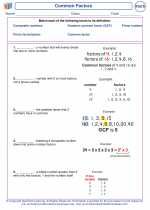Number Sequences
A number sequence is a list of numbers following a certain pattern or rule. Understanding number sequences is important in mathematics as it helps in recognizing patterns, making predictions, and developing critical thinking skills. There are different types of number sequences, including arithmetic sequences, geometric sequences, and Fibonacci sequences.
Arithmetic Sequences
An arithmetic sequence is a sequence of numbers in which the difference between any two consecutive terms is constant. This constant difference is called the common difference. The general form of an arithmetic sequence is:
an = a1 + (n-1)d
Where:
an = the nth term of the sequence
a1 = the first term of the sequence
n = the term number
d = the common difference
Geometric Sequences
A geometric sequence is a sequence of numbers in which each term after the first is found by multiplying the previous term by a constant value called the common ratio. The general form of a geometric sequence is:
an = a1 * r(n-1)
Where:
an = the nth term of the sequence
a1 = the first term of the sequence
r = the common ratio
Fibonacci Sequences
A Fibonacci sequence is a series of numbers in which each number is the sum of the two preceding ones, usually starting with 0 and 1. The general form of a Fibonacci sequence is:
Fn = Fn-1 + Fn-2
Where:
Fn = the nth term of the sequence
Study Guide
When studying number sequences, it's important to:
- Identify the type of sequence (arithmetic, geometric, Fibonacci)
- Understand the pattern or rule governing the sequence
- Be able to find specific terms of the sequence using the given formula
- Recognize real-life examples of number sequences
- Solve problems and puzzles involving number sequences
Practice identifying and working with different types of number sequences to strengthen your understanding of this important mathematical concept.
.◂Math Worksheets and Study Guides Fifth Grade. Common Factors
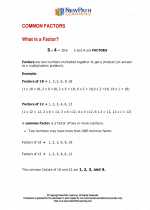
 Worksheet/Answer key
Worksheet/Answer key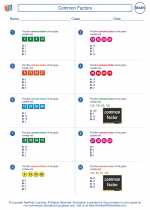
 Worksheet/Answer key
Worksheet/Answer key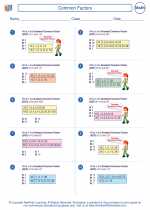
 Worksheet/Answer key
Worksheet/Answer key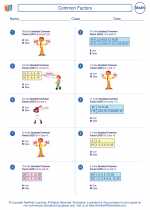
 Worksheet/Answer key
Worksheet/Answer key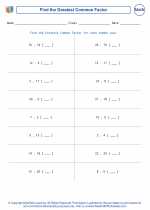
 Worksheet/Answer key
Worksheet/Answer key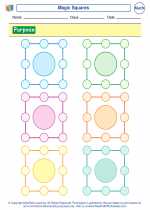
 Worksheet/Answer key
Worksheet/Answer key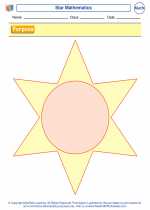
 Vocabulary/Answer key
Vocabulary/Answer key